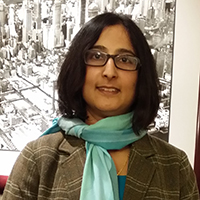Padma Narayan
PhD 1999 chemical engineering

Q: When did you decide you wanted to become and engineer and what made you choose this career path?
A: Well, before I entered high school, I felt drawn to a career in the STEM fields thanks to the support and encouragement I had from family, friends, and teachers. As a young kid, I was always inquisitive on how and why things worked around me, from what causes fall leaves to change color to what components are part of a computer circuit board. Reaching high school, I really enjoyed chemistry, physics and biology, and had teachers that made the lectures and laboratories fun and memorable. I came to a critical point in my senior year in high school when I was deciding between majoring in the medical field or chemistry. The advice I received from key teachers and family members influenced me to pursue chemical engineering, as I learned that engineers can always broadly impact any sector whether it is in academics or industry. Having diverse interests, I felt that this career path would keep me out of trouble! The creative part of being an engineer is the ability to design things and solve very diverse problems. As an undergraduate, I realized that pursuing my PhD to specialize in the area of biomedical engineering would help combine my passions in the medical field with chemical engineering. When I reflect on the education I received and where it has led me today, I would not change the pathway or trajectory since each step has been rewarding. As an engineer, I have immersed myself in both academia and industry, extensively in areas of specialty chemicals and pharmaceuticals which span very different sectors and have great opportunities for engineers. My work has involved launching new drug candidates, solving plant production issues, and dealing directly with customers. I have discovered that when the goal is to make choices that follow your own career passions - success should then result.
Q: What is the most rewarding part of your job?
A: The most rewarding aspects of my job are 1) developing innovative technologies or products that translate into beneficial impacts on society and 2) developing people. Turning technology into practice is extremely satisfying for global unmet needs in areas such as agriculture, medicine, and energy. Having the ability to mentor and lead people within my organization is fulfilling, especially to help them grow and succeed in their careers. In addition, providing mentorship to the next generation of scientists and engineers is a great reward where I am committed to volunteer efforts, especially in the STEM fields. A piece of advice that resonates with me is that you should try to go home each evening knowing that you have made a positive contribution somewhere in the world.
Q: What is the biggest challenge you face?
A: A great challenge is having unlimited time to achieve everything I would like to do, both professionally and personally!
Q: Describe yourself in three words.
A: Perseverant, Creative, Communicative
Q: What is a goal that you have yet to achieve?
A: Driving change in the STEM fields by outreach and career development initiatives where I can see my efforts improving diversity numbers in academia and industry by at least 10%! The other stretch goal would be to play a Stradivarius violin at Carnegie Hall.
Q: Why did you decide to volunteer for the Women in Chemical Engineering Panel Discussion and what are you hoping people will take away from the event?
A: My main motivation to volunteer and help organize the Women in Chemical Engineering Panel is to prepare the next generation of chemical engineers for their 'real world' career. This is an area I am passionate about. The panel is a great forum to provide students with mentoring and networking opportunities with experienced alumni. Most importantly, I realize that women engineers are still a minority in various sectors and the ability to help improve their career development and choices starts in the schools and universities. Addressing questions, concerns, and providing advice in a comfortable setting for women are beneficial to solutions for increasing enrollment and retention, as well as inspiring both students and alumni to succeed in STEM, and engineering!